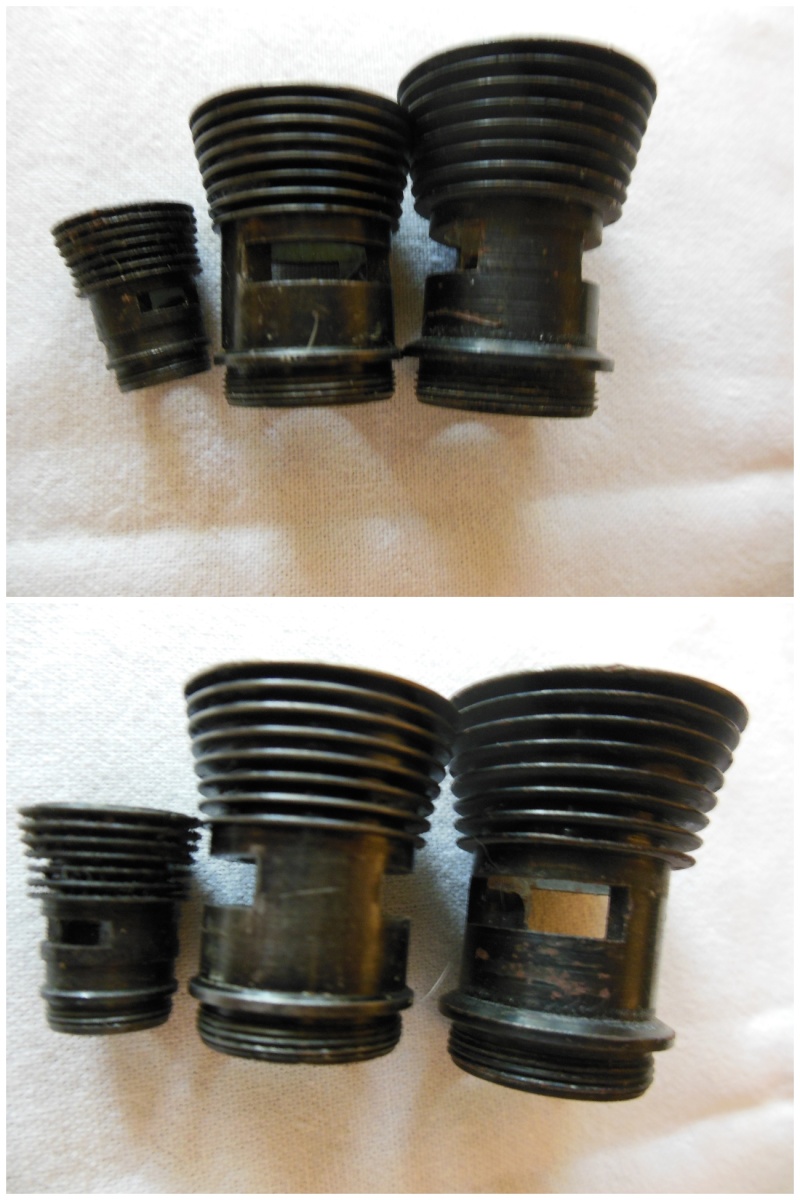Log in
Search
Latest topics
» Roger Harris revisitedby TD ABUSER Today at 2:30 am
» My latest doodle...
by batjac Yesterday at 10:05 pm
» Retail price mark-up.. how much is enough?
by gkamysz Yesterday at 9:29 pm
» Happy 77th birthday Andrew!
by roddie Yesterday at 9:22 pm
» My N-1R build log
by GallopingGhostler Yesterday at 3:04 pm
» Tee Dee .020 combat model
by 1/2A Nut Yesterday at 2:43 pm
» Chocolate chip cookie dough.........
by roddie Yesterday at 1:13 pm
» Purchased the last of any bult engines from Ken Enya
by sosam117 Yesterday at 11:32 am
» Free Flight Radio Assist
by rdw777 Yesterday at 9:24 am
» Funny what you find when you go looking
by rsv1cox Wed Nov 20, 2024 3:21 pm
» Landing-gear tips
by 1975 control line guy Wed Nov 20, 2024 8:17 am
» Cox NaBOO - Just in time for Halloween
by rsv1cox Tue Nov 19, 2024 6:35 pm
Cox Engine of The Month
Cox Cylinder Blacking
Page 1 of 1
 Cox Cylinder Blacking
Cox Cylinder Blacking
Here's what I do:-
Find some grotty cylinders. Rusty, pliered, castor oiled and generally uncared for!

Stick them on a whirly thing (I use a lathe) and clean them. I use wire wool (very fine), wet and dry (very fine), polish, string and flimsy cloths. A very fine file to remove burrs and plier marks.

If you notice, I also make a very tight fitting insert to pevent the blacking compounds working on the inside. Use anything, the following example shows "three in one". Nylon rod turned to a tight fit, tape wrapped around the rod and elastic bands.

Then it is dipped in a mild alkaline degreaser (tame sodium hydroxide and a few other chemicals) and agitated. I leave it there for about five minutes.
Then rinse in water, dry and insert into the blacking solution - there are many makes but this is the best I have found. No longer than 4 minutes. I usually do 31/2 minutes.

Remove, rinse and dry. When I say dry - dab with a paper towel.

Then leave to soak in dewatering fluid for 10 minutes. This appears to be WD40 by another name!

Remove and leave to dry and ............... this is what you should end up with.

New looking cylinders!
Find some grotty cylinders. Rusty, pliered, castor oiled and generally uncared for!

Stick them on a whirly thing (I use a lathe) and clean them. I use wire wool (very fine), wet and dry (very fine), polish, string and flimsy cloths. A very fine file to remove burrs and plier marks.

If you notice, I also make a very tight fitting insert to pevent the blacking compounds working on the inside. Use anything, the following example shows "three in one". Nylon rod turned to a tight fit, tape wrapped around the rod and elastic bands.

Then it is dipped in a mild alkaline degreaser (tame sodium hydroxide and a few other chemicals) and agitated. I leave it there for about five minutes.
Then rinse in water, dry and insert into the blacking solution - there are many makes but this is the best I have found. No longer than 4 minutes. I usually do 31/2 minutes.

Remove, rinse and dry. When I say dry - dab with a paper towel.

Then leave to soak in dewatering fluid for 10 minutes. This appears to be WD40 by another name!

Remove and leave to dry and ............... this is what you should end up with.

New looking cylinders!

ian1954- Diamond Member

- Posts : 2688
Join date : 2011-11-16
Age : 70
Location : England
 Re: Cox Cylinder Blacking
Re: Cox Cylinder Blacking
Impressive! Well done.
Phil
Phil

pkrankow- Top Poster

- Posts : 3025
Join date : 2012-10-02
Location : Ohio
 Re: Cox Cylinder Blacking
Re: Cox Cylinder Blacking
Nice work Ian. You always have great ideas!
Ron
Ron

Cribbs74- Moderator



Posts : 11907
Join date : 2011-10-24
Age : 50
Location : Tuttle, OK
 Re: Cox Cylinder Blacking
Re: Cox Cylinder Blacking
Ian, Is the blackening fluid only cosmetic or does it actually protect the metal? Also, how will it hold up to use? Thanks for sharing this information. Andy

anm2- Gold Member

- Posts : 293
Join date : 2013-03-30
 Re: Cox Cylinder Blacking
Re: Cox Cylinder Blacking
The blackening fluid protects the metal and binds itself to it forming black oxide coating. This solution contains a portion of selenium dioxide, I am not sure what this adds to the process but this solution is ideal for home use. The "true" blackening process are heat based and use seriously caustic solutions, not for home use.anm2 wrote:Ian, Is the blackening fluid only cosmetic or does it actually protect the metal? Also, how will it hold up to use? Thanks for sharing this information. Andy
This finish is more than cosmetic and ideal for cylinders. I also use it to protect, from rust, components in some of the tools that I make to support my machinery.
However, I would not put it on something that is subject to wear. (A hand gun slipping in and out of a holster would eventually wear down the finish).
Caution though - It is expensive!. The chemicals shown are in the order of £40 for the three conatiners but they have a shelf life of 30 years +. I also use it for smaller components like the tommy bars on diesel engines.
Do not let the blacking liquid contact the inside of the cylinder. The piston will no longer fit!
I have experimented with "gun blue" applications and they don't seem as robust as this.
Below are pictures of an "Anglicised" piece of Americana. It was well used and had started to become rust spotted as the original finish wore and was used in damp conditions. The barrel was "gun blued" but the "silence is golden" at the end of the barred was blackened. This was 3 years ago - picture taken today.


ian1954- Diamond Member

- Posts : 2688
Join date : 2011-11-16
Age : 70
Location : England
 Re: Cox Cylinder Blacking
Re: Cox Cylinder Blacking
Ian,
That's the mistake I made. I threw the whole cylinder in the solution. What's worse I walked away and forgot it for 8hrs!
That's the mistake I made. I threw the whole cylinder in the solution. What's worse I walked away and forgot it for 8hrs!


Cribbs74- Moderator



Posts : 11907
Join date : 2011-10-24
Age : 50
Location : Tuttle, OK
 Re: Cox Cylinder Blacking
Re: Cox Cylinder Blacking
8 hrs !!! Tut..Tut! No longer that 4 minutes with this stuff.Cribbs74 wrote:Ian,
That's the mistake I made. I threw the whole cylinder in the solution. What's worse I walked away and forgot it for 8hrs!
But we all make mistakes - some more than others and I don't admit to all of mine!

ian1954- Diamond Member

- Posts : 2688
Join date : 2011-11-16
Age : 70
Location : England
 Re: Cox Cylinder Blacking
Re: Cox Cylinder Blacking
What do you use to mask the inside of the cylinder with to not get the inside coated? Looks like just tight fitting delrin or you use a paint mask of some sort. Maybe wax would work if you are careful.

Jason_WI- Top Poster


Posts : 3123
Join date : 2011-10-09
Age : 49
Location : Neenah, WI
 Re: Cox Cylinder Blacking
Re: Cox Cylinder Blacking
For 010, 020 and 049 - I use a nylon rod turned to a tight fit.Jason_WI wrote:What do you use to mask the inside of the cylinder with to not get the inside coated? Looks like just tight fitting delrin or you use a paint mask of some sort. Maybe wax would work if you are careful.
The rod shown was the 020 rod - for the Olympic cylinder I wrapped electrical tape around it for a very tight fit and then elastic bands to slide the 09 piston on at the end. All remained water tight.
Three different methods - I have also used PTFE tape (didn't work!), wax (didn't work!) - it didn't like sticking to the metal, I filled the cylinder with candle wax and it shrank away from the cylinder in places.
I have never tried a liquid paint mask but masking tape stuck to the inside didn't hold and masking tape wrapped around a rod was a little iffy. When compressed it didn't bounce back!

ian1954- Diamond Member

- Posts : 2688
Join date : 2011-11-16
Age : 70
Location : England
 Similar topics
Similar topics» #7 .049 cylinder
» Cylinder Performance Figures
» Anyone know what this item is?
» TD 020 and Pee Wee cylinder interchangeability
» #0 cylinder
» Cylinder Performance Figures
» Anyone know what this item is?
» TD 020 and Pee Wee cylinder interchangeability
» #0 cylinder
Page 1 of 1
Permissions in this forum:
You cannot reply to topics in this forum

 Rules
Rules






